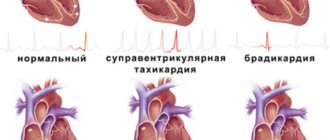Causes of headaches and ear congestion
Constant pain in the head, which causes blocking of the ears, is an alarming symptom for which you should seek medical help. It may indicate physiological changes that do not require therapy, including water entering the ear canals or fatigue. However, in some cases, this sign will help identify dangerous diseases in the early stages and begin treatment on time.
High blood pressure
Chronic hypertension is a disorder in which the pressure in the arteries exceeds normal levels. In a healthy person at rest it is 120/80 mmHg, but it is important to take into account individual characteristics. Blood pressure is considered high if it is 140/90 mmHg. and more. The condition can be caused either by an increase in circulating blood volume or by vascular spasms.
Blood pressure is easy to measure yourself using a tonometer. If the readings are too high, you should seek medical help. Without timely treatment, hypertension poses a danger to the patient and can cause the following complications:
- angina pectoris - acute pain in the chest;
- myocardial infarction - a sharp disruption in the supply of oxygen to the heart muscle;
- chronic heart failure – deterioration of the heart valve apparatus caused by increased load on it;
- arrhythmia is a disturbance in the heart rhythm that can cause a heart attack.
When blood pressure rises, the patient has a headache and pressure on the ears. Symptoms such as dizziness, nausea, hearing loss and poor coordination of movements also occur. With a sudden attack, fainting is possible. Hypertension can be triggered by an increase in atmospheric pressure, physical activity, stress, disruption of the daily routine and other factors. For chronic hypertension, it is necessary to take medications in a course, including to remove excess fluid.
Inflammation of the paranasal sinuses
Sinusitis is an inflammation of the mucous membrane of the paranasal sinuses. With this disease, the nose and ears are blocked, the head hurts, and the overall body temperature rises. The process can be caused by a viral or bacterial infection, and cold weather is often the trigger. Sinusitis occurs in acute or chronic forms and may recur after some time. In addition, the disease can manifest itself as a complication of seasonal colds.
The paranasal sinuses are cavities formed by the bones of the skull. In a healthy person, they are not filled with anything, and their walls are lined with mucous membrane. During the inflammatory process, pathological contents appear in them, which causes headaches. Sinusitis can be serous (with clear liquid contents), catarrhal (cavities filled with mucus), purulent and mixed. Depending on the location of the process, there are several types of this disease:
- sinusitis - inflammation of the maxillary sinus, often occurs as a complication of a cold;
- frontal sinusitis - the process affects the frontal paranasal sinus;
- ethmoiditis - inflammation of the mucous membrane located in the ethmoid labyrinth;
- sphenoiditis - damage to the mucous membrane of the sphenoid sinus.
At home, you can conduct an initial diagnosis of sinusitis. If you sharply tilt your head forward and down, a sharp pain occurs in the forehead. This indicates fluid accumulation in the sinuses. Also, with inflammation of the maxillary sinuses, headaches intensify at low temperatures and decrease in a warm room.
Diseases of the hearing organ
If your ears are blocked due to pain in your head, you should undergo an examination by an otolaryngologist. Chronic diseases of the organ of hearing cause a sharp deterioration in health, increased body temperature, impaired balance and coordination of movements, as well as other symptoms and complications.
- Otitis is an inflammation of the ear in any of its parts. Depending on the location, they distinguish between external, middle and internal, and according to the nature of the course - acute and chronic otitis. The process can be caused by hypothermia or herbs, as well as viral and bacterial infections. Internal purulent otitis is the most dangerous because it can spread to the membranes of the brain and cause meningitis.
- Acoustic neuroma is a benign neoplasm. Its first symptoms include constant headaches and dizziness, as well as hearing loss. Over time, nausea, loss of coordination of movements, and atrophy of the masticatory muscles appear. Neuroma does not disappear on its own and may increase in size. To treat it, surgical techniques, radiation therapy, or combined methods are prescribed.
- Mechanical damage or blockage of the ear canals is another reason why headaches and blocked ears occur. You can get injured even at home, if you do not properly clean your ears or if sharp objects get into your ear canals. The cause of the blockage is often cerumen plug - after its surgical removal, headaches disappear and hearing is restored.
If you suspect a disease of the hearing organ, you must undergo an examination by an otolaryngologist. It uses a special device - an otoscope, which allows you to detect various disorders in the auditory canals. The inner ear is difficult to access for diagnosis and has a complex structure, so it is important to prevent the spread of infection from the external parts.
Other reasons
Headache and ear congestion are common symptoms for a large number of diseases and conditions. They are not necessarily related to hearing health, so it is important to pay attention to associated signs. A more detailed examination reveals the following pathologies:
- cervical osteochondrosis is a chronic disease of the spine in which blood circulation and innervation of the tissues of the head are disrupted;
- viral diseases - influenza, ARVI also manifest themselves as headaches and hearing impairment;
- consequences of traumatic brain injuries , which can manifest themselves many years later.
These symptoms can also occur in a healthy person. So, they often bother you during a flight or in other cases of changes in atmospheric pressure, when water gets into the ear canals, during fatigue or prolonged work at the monitor. However, if they occur regularly, doctors at the Clinical Brain Institute recommend undergoing an examination and determining the exact cause.
Non-pathological causes
Factors that are not associated with pathologies can be called relatively harmless. This means that dizziness and fog before the eyes will go away if you immediately limit the impact of these factors on the body. Among these reasons:
- Stress, strong emotional stress, fear - all this leads to a sharp release of adrenaline into the blood. The blood vessels narrow, and the brain receives insufficient oxygen.
- Dehydration.
- Side effects of medications.
- Weak vestibular apparatus.
- Heavy physical activity.
- Pregnancy. Dizziness, as well as fog before the eyes, can occur during the period of hormonal changes in the body.
- Diet.
- Alcohol abuse.
These reasons do not always lead to the development of the disease. However, there is a risk that during dizziness and darkening of the eyes a person will fall and get injured.
Diagnostic methods
If the patient often suffers from headaches and stuffy ears, it is necessary to contact us for a full examination. A simple examination will only indicate visible deviations from the norm, therefore, to understand a more accurate picture, additional techniques are prescribed:
- tonometry – blood pressure measurement;
- MRI of the head and cervical spine is one of the most informative diagnostic methods, which will indicate hidden disorders and neoplasms;
- blood tests - prescribed to determine the causative agent of bacterial diseases, as well as to assess hormonal balance;
- additional methods for diagnosing diseases of the hearing organ, including audoscopy, smear tests, and ultrasound examination.
The Clinical Brain Institute has modern equipment for diagnosing diseases that are accompanied by headaches and ear congestion. Here you can quickly and accurately determine the underlying disease that causes deterioration in well-being.
Treatment of headaches and ear congestion
Treatment tactics are selected individually, depending on the cause of the headache and ear congestion, as well as the patient’s age, concomitant diseases and other factors. To eliminate both the root cause and symptoms of diseases, the following methods can be proposed:
- antibiotic therapy is the main stage in the treatment of bacterial inflammatory processes, as well as the prevention of purulent complications;
- symptomatic treatment , which includes anti-inflammatory, painkillers, ear drops;
- surgical methods - necessary to remove sulfur plugs, neoplasms, as well as to extract the contents of the paranasal sinuses for sinusitis;
- physiotherapy – prescribed for chronic ENT diseases.
Doctors at the Clinical Institute of the Brain prescribe a minimum of therapeutic techniques that will bring maximum results. Here are specialists of a wide and narrow profile with many years of experience in treating various diseases that manifest themselves as headaches and hearing impairment.
Pathological causes of blurred vision and dizziness
The above symptoms may indicate a serious illness. They are included in the symptoms of the following diseases:
- vegetative-vascular dystonia;
- anemia;
- hypoglycemia;
- vascular diseases;
- migraine;
- atherosclerosis;
- stroke;
- diseases of the spine;
- intracranial tumors;
- head injuries.
Foggy vision often occurs in people with glaucoma. This is an ophthalmopathology in which intraocular pressure increases. During an attack of glaucoma, dizziness may also occur.
Prevention methods
At home, you should follow simple recommendations from doctors. They will help prevent the development of diseases that cause headaches, ear congestion and general deterioration in well-being. The set of preventive measures includes:
- protection of the head and ears from hypothermia;
- proper nutrition with enough vitamins at any time of the year;
- timely treatment of colds.
The Clinical Brain Institute offers all the conditions for high-quality and comfortable treatment of disorders that cause headaches and ear congestion. There is also timely equipment located here, thanks to which you can quickly and accurately determine the cause of poor health and make an accurate diagnosis.
Clinical Brain Institute Rating: 5/5 — 4 votes
Share article on social networks







